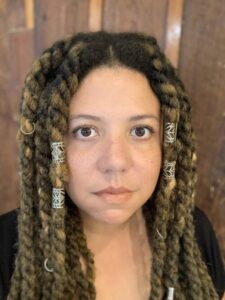February 27, 2022
February 2022: Jamila Johnson

Jamila Johnson (she/her)
Advisory Board, New Orleans Chapter
The drive down the winding Tunica Trace Road in rural Louisiana is a long one. The 40 minutes along this stretch is heavy, and dead ends at Louisiana State Penitentiary, more commonly known as Angola. The trees part at a security gate. A small museum sits off the parking lot, and a brick sign announces your arrival at the largest maximum security prison in the country.
Angola is a working plantation prison, situated on 18,000 acres along the Mississippi River. You could fit the island of Manhattan on the sprawling Louisiana land.
Angola began as a convict-leasing plantation. After emancipation Black Louisianans often had to make a difficult decision—stay in the location where someone had been enslaved, or journey out in search of a new home and a new job. Doing the latter was treacherous. Louisiana’s Black Codes meant a person could be arrested if you did not have stable employment or stable housing. An arrest meant a conviction, and a journey to the very land at the end of Tunica Trace Road. In 1881, 20 percent of the people who stepped foot onto the convict leasing plantation died there.
Much of my work these days involves the U.S. Constitution, this very land, and the people who serve hard labor sentences there today. But this isn’t how my career started.
My trajectory changed dramatically after the 2016 Presidential election. At the time of the election, I was a partner in a regional Pacific Northwest law firm, and one of only a handful of Black women in partnership at larger Seattle law firms. I had been an ACS Student Chapter leader at the University of Washington School of Law, participated heavily in my community through service on various boards, and helped to administer my law firm’s pro bono program. I also ate a lot of rubbery plates of banquet chicken.
A month after the election, frustrated, and in a progressive political bubble, I applied for one job: a position running the criminal justice work of the Southern Poverty Law Center in the State of Louisiana. They hired me.
When former President Donald Trump gave his report on his first 100 days in office, I had already left the law firm, sold my condo and my bright yellow Mini Cooper, made arrangements for my son in his junior year of high school, moved from Seattle to New Orleans and was driving a white pickup truck through the rural Deep South.
Today, nearly five years later, I am the Deputy Director of the Promise of Justice Initiative where I work to end the injuries from more than a century of Jim-Crow law, address the policies that have made Louisiana the incarceration capital of the country, and litigate Eighth Amendment class actions over the conditions of confinement in plantation prisons in the Deep South. I worked heavily with the Constitution in my private practice, but the meaning of the Constitution has never mattered as deeply to any one I had ever worked with, as it does for the men at Angola.
There are also few people I can imagine in the Country who have been more deprived of the promises of that Constitution.
For instance, our office represented Evangelisto Ramos in his petition to the U.S. Supreme Court. Mr. Ramos was one of many men and women in Louisiana who were sentenced to life in prison without the possibility of parole, despite two jurors at his trial finding him not guilty. In April 2020, the U.S. Supreme Court called this practice a Jim Crow relic passed to silence the voices of Black jurors and to convict more Black people.
Since that decision, it has been my job, and my colleagues’ jobs, to try to extend this ruling to the more than 1,500 men and women who remain in prison, even though the U.S. Supreme Court said the law deprived them of their Sixth Amendment rights and was racially motivated. The majority of the more than 1,000 men our office represents on this claim sleep each night at Angola. We have done these representations with the help of more than 780 volunteer lawyers from Seattle and Singapore, including lawyers who volunteered with ACS. We continue to fight for them each and every day.
ACS’s vision is to realize the promises of the U.S. Constitution. I want to thank those who volunteered from chapters across the country to fight for those who have seldom seen the promises within the Constitution. The drive on Tunica Trace Road can be lonely: the things seen at the end of that road are isolating. But 15 years after my first exposure to ACS, I carry the ACS community with me each time I make that drive.
Want to learn more about Jim Crow juries? Check out this Fault Lines documentary. Learn more about the Promise of Justice Initiative here.



